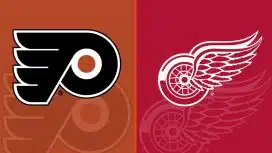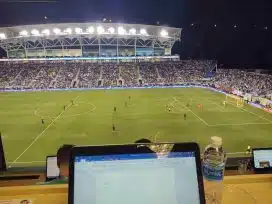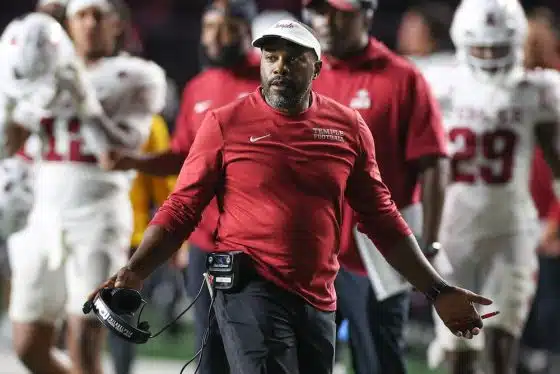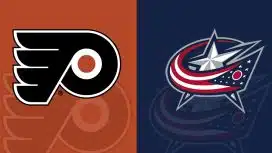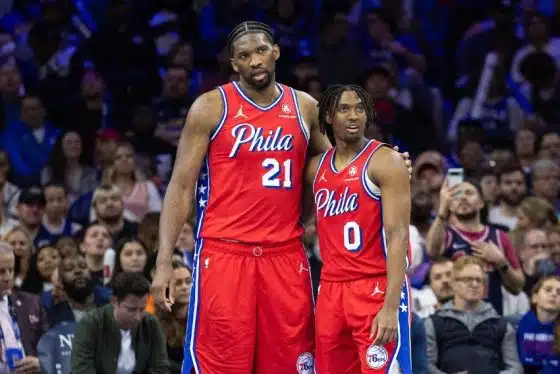Phillies
Top 25 Players to Ever Play for the Phillies: No. 10, Jim Thome
As Major League Baseball looked to improve its image in the wake of the 1994 strike, they received plenty of help from a vast, vast amount of sluggers across the league bashing home runs at ridiculous paces. With 196 homers over the course of the decade with the Cleveland Indians, Jim Thome was certainly no slouch in that regard.
Entering the fall of 2002 as one of the league's highest-touted free agents, the Paul Bunyan-esque first baseman signed a six-year, $85 million deal with the Phillies in was is still, to this day, one of their most important signings in franchise history. After nine consecutive missed postseasons — seasons that saw the team get quite familiar with the bottom tier of the National League East standings in a failed attempt to recapture their 1993 glory — the Thome signing was the Phils' beacon to fans and the rest of the league that those days were over, and it was time for them to re-emerge as a contender.
It's no surprise he was among the most coveted players that year, after a season that saw him turn in the best of his career. He slashed .304/.445/.677, along with a career-high 52 home runs, 118 RBI and a league-high 122 walks. His Indians, though, helped define "close but no cigar" by losing two World Series in 1995 and 1997, an ALCS to the eventual-champ Yankees in 1998 and ALDS series to the Orioles (1996), Red Sox (1999) and Mariners (2001). After missing the postseason entirely in 2000 and 2002, the then-31-year-old wanted the chance at a coveted (and much deserved) World Series ring, and he thought his best opportunity to do so would be in the red pinstripes.
Thome's first season as a Phillie saw him hit 47 homers, finishing one shy of the team's single-season home run record (which would later be shattered by Ryan Howard) as the team closed out Veterans Stadium. In 2004, he hit his 400th career home run. Injuries plagued Thome's 2005 campaign, however, and as a young Howard rapidly ascended his way to the majors, he was dealt after the season to the Chicago White Sox for Aaron Roward, Gio Gonzalez and Daniel Haigwood. After playing with the White Sox, Dodgers, Twins as well as a return to the Indians, Thome signed with the Phillies yet again for the 2012 season, still chasing that ring off the heels of the best season in franchise history. Ultimately, he played 30 games before being sent to Baltimore to cap off an illustrious career — a career that now sees him finally eligible for the Hall of Fame.
Career Accomplishments
- Played 24 years with six teams
- Five-time All-Star (1997, 1998, 1999, 2004, 2006)
- 2006 AL Comeback Player of the Year
- 2004 Lou Gehrig Memorial Award
- 2001, 2004 Marvin Miller Man of the Year
- 2003 NL Home Run leader
- 2002 Roberto Clemente Award winner
- 1996 Silver Slugger Winner
- 2016 inductee into the Philadelphia Baseball Wall of Fame
*Awards were not factored into the formula
Career-Defining Moment
In 2011, Thome became the eighth player to hit 600 home runs, recording the milestone blast on Aug. 15. That home run was hit just an inning after he hit No. 599, making him the first player to hit his 599th and 600th home runs in the same game. Ultimately, Thome finished his career with 612 home runs, good enough for eighth all-time.
Reasoning for ranking
With 15 seasons of a bWAR of two or more, Thome starts out with 15 points. Five seasons of a bWAR of five or higher, combined with no seasons of a bWAR over eight give him 15 more points, which means he has a total of 30 points there.
All-time, Thome finishes in the top 25 in home runs (612; eighth) and OPS (.956; 18th), for another 10 points. Finishing in the top 50 for RBI (1,699; 26th), earned Thome another four points.
Also solidifying his place in the top 200 all-time for hits (2,328; 144th) and doubles (451; 104th), Thome earns two more points. In total, Thome finished 11th on the list with 46 points — 30 for how he finished in career bWAR, and 16 for how his career totals stack up among the baseball annals.
Based on our subjective importance scale, Thome scored an eight of 10, because of the magnitude of his initial signing and the guidance he provided to young players as the team was looking to embark on its golden era.
Explanation of scientific formula
The player rankings formula combines both traditional and advanced statistics/metrics and assigns a point total to each category.
Previous Players
- No. 25, Ryan Howard
- No. 24, Roy Oswalt
- No. 23, Kenny Lofton
- No. 22, Jimmy Rollins
- No. 21, Cole Hamels
- No. 20, Cliff Lee
- No. 19, Tony Perez
- No. 18, Bobby Abreu
- No. 17, Scott Rolen
- No. 16, Richie Ashburn
- No. 15 – Chase Utley
- No. 14 – Ryne Sandberg
- No. 13 – Dick Allen
- No. 12 – Jim Bunning
- No. 11 – Fergie Jenkins
